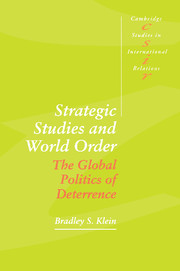2 - THE POLITICS OF STRATEGIC STUDIES
Published online by Cambridge University Press: 06 July 2010
Summary
… in the conversation among the Powers there is a convention of silence about the place of their human subjects, any interruption of which is a kind of subversion.
(Hedley Bull)There are many reasons for being concerned about military-related issues, the existence of vast nuclear arsenals being only one of them. While there is nothing particularly contemporary about questions of war and peace, it is fair to say that in the twentieth century such issues have become paramount to the life and death of whole societies. When examining those weapons of mass destruction and the strategies so crucial to their deployment, attention needs to be focused on the ways of thinking that have guided practitioners of policy. In a world in which such weapons have been widely “used” in a variety of ways short of (though, of course, including) actual detonation in warfare, the communicative, symbolic and interpretive dimensions of strategy assume enormous importance. Moreover, the very processes of militarization, both in terms of domestic armaments infrastructures and a worldwide military order, tell us that military strategy has an importance that transcends the boundaries of the standard battlefield epic.
A significant body of critical peace research has, in the last quarter of a century, contributed to a detailed understanding of how war and armaments accumulation have shaped, and often devastated, Third World affairs. Not surprisingly, such critical undertakings have remained marginal with respect to the main work of the Western strategic community. The overwhelming majority of the work produced by analysts in Strategic Studies has concerned issues of deterrence and security pertaining to the major states and their two respective alliances, NATO and the former Warsaw Pact.
- Type
- Chapter
- Information
- Strategic Studies and World OrderThe Global Politics of Deterrence, pp. 13 - 38Publisher: Cambridge University PressPrint publication year: 1994



